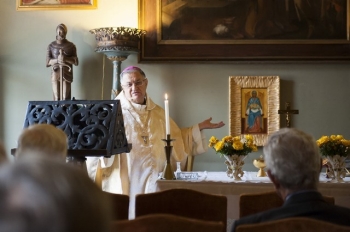“Do not haggle with God”
 Msgr. Fouad Twal, the Latin Patriarch of Jerusalem and Grand Prior of the Order of the Holy Sepulchre, during a Mass celebrated at the autumn meeting of the Grand Magisterium, before the icon of Our Lady of Palestine, which was recently placed in the Palazzo della Rovere to be venerated.
Msgr. Fouad Twal, the Latin Patriarch of Jerusalem and Grand Prior of the Order of the Holy Sepulchre, during a Mass celebrated at the autumn meeting of the Grand Magisterium, before the icon of Our Lady of Palestine, which was recently placed in the Palazzo della Rovere to be venerated.
The Grand Magisterium’s days of meetings never begin without having celebrated the Eucharist together. It is not just another moment in a long series of appointments of the members of the Grand Magisterium, during the two days for which they come together twice a year, but it is the conditio sine qua non, that which gives meaning to everything that the Order does in the Holy Land and throughout the world.
It is a key time, therefore, to return together to the source and to entrust everything to God’s hands. On November 10, 2015, at the opening of the Grand Magisterium’s autumn session, Cardinal Edwin O’Brien, the Grand Master, presided over the Holy Mass. Commenting on the complex Gospel of Luke 17:7-10, that of the “useless servants”, the Grand Master said: “In this passage the Lord is not sympathetic and appealing, but seeks to undermine a dominant trend in the spirituality of those days, which is also in our own. We believe that God owes us something; that, if we behave well, God should repay us. However – he continued – God does not owe us anything, he gave us life and we are called to live not seeking immediate rewards for our actions. Do not haggle with God.” A key word in the homily was “service”. Every good deed that we carry out is a gift of God’s grace and we should be grateful for the opportunity that He gives us to put ourselves at service.
The following day Msgr. Fouad Twal, the Latin Patriarch of Jerusalem and Grand Prior of the Order, celebrated the Holy Mass. Beginning with the Gospel of Luke 17:1-19, the passage about the ten healed lepers of whom only one returned to thank Jesus, the Patriarch emphasized the call of the Order, saying: “If Jesus gave his hand to the lepers, we too as an Order, as a Church, we must help those who suffer. Can we heal these people with our love, our friendship and our solidarity?”. The example which we can refer to for our attitudes is that of the Holy Family of Nazareth, an example of humility, silence, peace and trust.
Msgr. Twal concluded with a thought directed to the Blessed Virgin Mary, Queen of Palestine, whose icon was behind the altar set up in one of the rooms of the Palazzo della Rovere: “This Mary is holding not Jesus in her arms but the entire city of Jerusalem, with all its joys, sorrows and all its inhabitants.”
(December 5, 2015)



